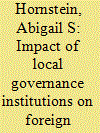|
|
|
Sort Order |
|
|
|
Items / Page
|
|
|
|
|
|
|
| Srl | Item |
| 1 |
ID:
174447


|
|
|
|
|
| Summary/Abstract |
Retrospective voting is a crucial component of democratic accountability. A large literature on retrospective voting in the United States finds that the president’s party is rewarded in presidential elections for strong economic performance and punished for weak performance. By contrast, there is no clear consensus about whether politicians are held accountable for the local economy at other levels of government, nor how voters react to the economy in a complex system of multilevel responsibility. In this study, we use administrative data on county-level economic conditions from 1969 to 2018 and election results across multiple levels of government to examine the effect of the local economy on elections for local, state, and federal offices in the United States. We find that the president’s party is held accountable for economic performance across nearly all levels of government. We also find that incumbents are held accountable for the economy in U.S. House and gubernatorial elections. Our findings have broad implications for literatures on representation, accountability, and elections.
|
|
|
|
|
|
|
|
|
|
|
|
|
|
|
|
| 2 |
ID:
117489


|
|
|
|
|
| Publication |
2012.
|
| Summary/Abstract |
The Credit Crunch ushered in an era of austerity with massive cuts and job losses. It highlighted the gulf between the world of real people and the abstraction of high finance. Put simply, to prevent the melt-down of the global economy, the needs, hopes and ambitions of millions are being sacrificed. Who controls and issues money is key. To be viable any system must be big enough for people to have faith it won't fail, and it has to be administered soundly. Local government is accountable to its electorate and, as such, should put their welfare first. It is essentially an administrative machine and certainly isn't going to go away. A truly local economy could emerge with authorities initially paying part of their staff's wages in local currency and accepting it in payment of rates. At a stroke, job cuts could be reversed and people's skills and experience valued again.
|
|
|
|
|
|
|
|
|
|
|
|
|
|
|
|
| 3 |
ID:
158443


|
|
|
|
|
| Summary/Abstract |
The global financial turmoil of 2008 has resulted in the curtailment of military expenditure in most western countries. At a sub-regional-level reductions in the level of activity at a major military facility can have significant economic impact. In the light of this, the paper has two objectives: to analyse the impact of the decision to terminate naval shipbuilding at the United Kingdom’s Portsmouth Naval Base; and, for illustrative purposes, to examine the possible economic consequences of further contraction at the facility. In pursuit of these aims, it is necessary to establish the output, income and employment generated by the base using a bespoke input–output model. The methodology employed can, with appropriate adjustments, be utilised in other military or civilian contexts.
|
|
|
|
|
|
|
|
|
|
|
|
|
|
|
|
| 4 |
ID:
192403


|
|
|
|
|
| Summary/Abstract |
People’s Liberation Army (PLA) related business was rampant in China in the 1980s and 1990s, and they significantly disrupted the local economy. However, due to limited data about PLAs, this issue is rarely investigated and thus the negative impact is hardly measured. In this paper we introduce a new proxy for measuring the approximate level of PLA related business in a specific city, PLA hospital score, to identify cities that are more affected by PLA related business closure. We then employ a difference-in-differences (DID) framework and show that PLA related business closure does bring positive effects to China’s local economy, about a 2% increase in GDP growth per year. We also find that this effect is more significant in cities with median economic size and cities that rely more on secondary and tertiary sectors. We finally provide a possible channel of this effect, which mainly works through providing a more efficient and competitive market to local private firms as well as an investment-friendly environment that attracts foreign investments.
|
|
|
|
|
|
|
|
|
|
|
|
|
|
|
|
| 5 |
ID:
133185


|
|
|
|
|
| Publication |
2014.
|
| Summary/Abstract |
This paper exploits the substantial variation in market institutions across provinces in China to examine the impact of institutional quality on foreign listing. Firms that are listed on the U.S. and U.K. exchanges are more likely to come from better regulated provinces and tend to be at the top of a corporate pyramid. However, though the impact on firm performance of market institutions and pyramidal affiliations persists briefly post-listing with firms recording lower EPS and higher raw returns in the first year, it does not help predict whether firms remain listed abroad in 2012. Thus, we conclude that headquarters' market institutions shape a firm through time of listing and have diminished influence over time.
|
|
|
|
|
|
|
|
|
|
|
|
|
|
|
|
| 6 |
ID:
169856


|
|
|
|
|
| Summary/Abstract |
the literature proposes that a booming minerals sector leads to a development curse. The mineral markets in China experienced a prolonged boom over the period of 2000–2010. We empirically examine the effects of mineral resources on employment in county economies during the boom. We consider the endogeneity of the resource measure and employ an instrumental variables approach to resolve the problem. We find the mining boom exerts a significant “crowding out” effect on the manufacturing employment in mineral-resource-dependent counties, but benefits the employment in services. Because the increase in mining employment is sizeable in a mining boom, the overall employment in the resource-dependent counties has shown a small growth. These results are robust to alternative samples. Our findings confirm the argument that resource booms undermine manufacturing sectors through deindustrialization effects, though little evidence shows the existence of a resource curse in overall employment. We conclude that for a developing economy with rich mineral resources and a large population, it would be hard to following the road of industrialization relying on manufacturing.
|
|
|
|
|
|
|
|
|
|
|
|
|
|
|
|
| 7 |
ID:
130696


|
|
|
| 8 |
ID:
165424


|
|
|
|
|
| Summary/Abstract |
Recent studies of economic voting have focused on the role of the local economy, but with inconclusive results. We argue that while local economic conditions affect incumbent support on average, the importance of the local economy varies by citizens’ interactions with it. More recent and frequent encounters with aspects of the local economy make those aspects more salient and, in turn, feature more prominently in evaluations of the incumbent government. We label this process “context priming.” We provide evidence for these propositions by studying local housing markets. Linking granularly detailed data on housing prices from Danish public registries to both precinct-level election returns and an individual-level panel survey, we find that when individuals interact with the housing market, their support for the incumbent government is more responsive to changes in local housing prices. The study thus provides a framework for understanding when citizens respond politically to the local economy.
|
|
|
|
|
|
|
|
|
|
|
|
|
|
|
|
|
|
|
|
|